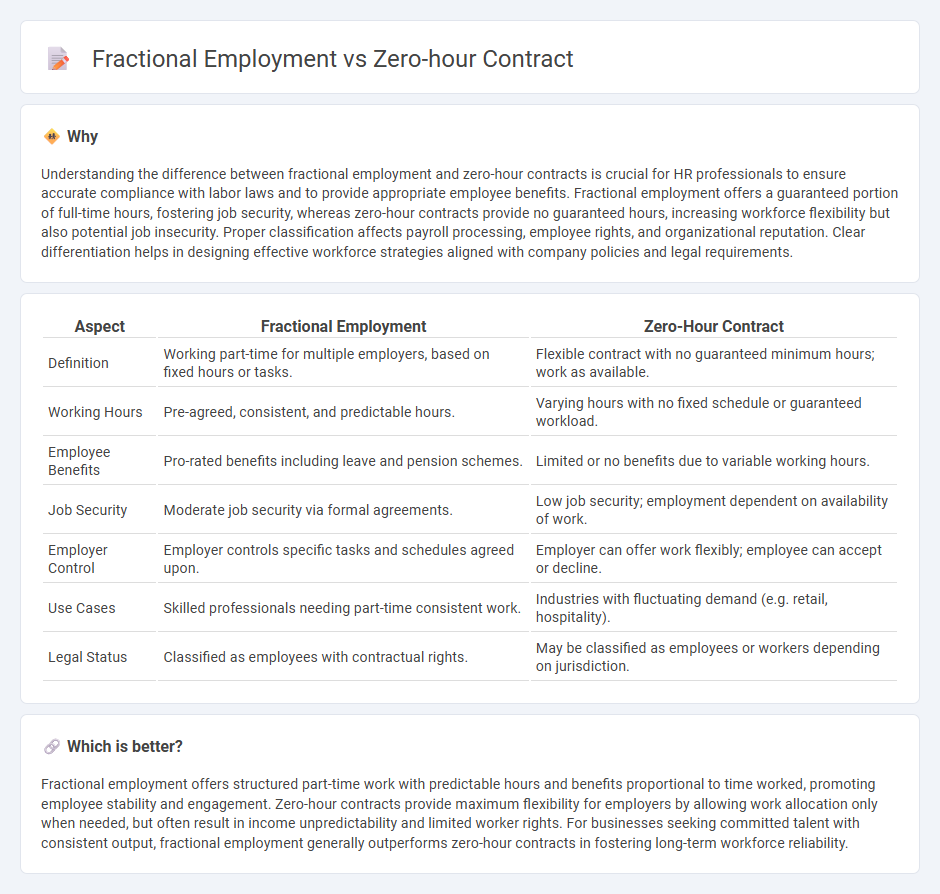
Fractional employment offers workers a fixed proportion of full-time hours with guaranteed pay and benefits, providing stability and predictability. Zero-hour contracts, by contrast, do not guarantee any minimum hours, resulting in variable income and limited worker security. Discover the key differences and implications for both employers and employees.
Why it is important
Understanding the difference between fractional employment and zero-hour contracts is crucial for HR professionals to ensure accurate compliance with labor laws and to provide appropriate employee benefits. Fractional employment offers a guaranteed portion of full-time hours, fostering job security, whereas zero-hour contracts provide no guaranteed hours, increasing workforce flexibility but also potential job insecurity. Proper classification affects payroll processing, employee rights, and organizational reputation. Clear differentiation helps in designing effective workforce strategies aligned with company policies and legal requirements.
Comparison Table
| Aspect | Fractional Employment | Zero-Hour Contract |
|---|---|---|
| Definition | Working part-time for multiple employers, based on fixed hours or tasks. | Flexible contract with no guaranteed minimum hours; work as available. |
| Working Hours | Pre-agreed, consistent, and predictable hours. | Varying hours with no fixed schedule or guaranteed workload. |
| Employee Benefits | Pro-rated benefits including leave and pension schemes. | Limited or no benefits due to variable working hours. |
| Job Security | Moderate job security via formal agreements. | Low job security; employment dependent on availability of work. |
| Employer Control | Employer controls specific tasks and schedules agreed upon. | Employer can offer work flexibly; employee can accept or decline. |
| Use Cases | Skilled professionals needing part-time consistent work. | Industries with fluctuating demand (e.g. retail, hospitality). |
| Legal Status | Classified as employees with contractual rights. | May be classified as employees or workers depending on jurisdiction. |
Which is better?
Fractional employment offers structured part-time work with predictable hours and benefits proportional to time worked, promoting employee stability and engagement. Zero-hour contracts provide maximum flexibility for employers by allowing work allocation only when needed, but often result in income unpredictability and limited worker rights. For businesses seeking committed talent with consistent output, fractional employment generally outperforms zero-hour contracts in fostering long-term workforce reliability.
Connection
Fractional employment and zero-hour contracts are connected through their flexible work arrangements, allowing employers to adjust labor based on fluctuating demand. Fractional employment divides a full-time role into parts, enabling multiple employees to share responsibilities, while zero-hour contracts offer no guaranteed hours, giving employers maximum scheduling flexibility. Both models impact workforce management by balancing cost efficiency with employee availability in dynamic labor markets.
Key Terms
Work Hours Flexibility
Zero-hour contracts provide employees with unpredictable work hours, as they are not guaranteed a minimum number of hours, offering maximum flexibility to employers but less stability for workers. Fractional employment divides a full-time role into several part-time roles, ensuring fixed and predictable hours that enhance work-life balance while maintaining flexibility. Explore the differences in work hours flexibility between these models to determine which best suits your workforce needs.
Employment Security
Zero-hour contracts offer minimal employment security as workers have no guaranteed hours and income can fluctuate unpredictably, often leading to financial instability. Fractional employment, by contrast, typically involves a fixed part-time schedule, ensuring steady income and greater predictability, thus enhancing job security. Explore detailed comparisons and practical implications to better understand which arrangement suits your needs.
Compensation Structure
Zero-hour contracts offer compensation based solely on hours worked without a guaranteed minimum, often resulting in unpredictable income and limited benefits. Fractional employment provides fixed remuneration for a set percentage of full-time hours, ensuring consistent pay and pro-rated benefits corresponding to the workload committed. Explore the detailed differences in compensation structures to determine which employment model suits your financial needs.
Source and External Links
Zero-hour contract - Wikipedia - A zero-hour contract is an employment agreement in the UK where the employer is not obliged to provide any minimum working hours and the worker is not required to accept work, offering flexibility but often criticized as exploitative labor practice.
Step-by-step plan: Hiring on-call employees with a zero-hours contract - Zero-hours contracts pay workers only for hours worked, require advance notice of work, and entitle employees to rights like payment when work is canceled and the possibility of fixed contracts after 12 months.
What is a Zero-Hour Contract? - Justworks Glossary - Zero-hour contracts offer flexibility for employers and employees by not guaranteeing minimum hours, are popular in sectors like hospitality, and include benefits like sick pay and holiday pay, but also carry risks such as income uncertainty for workers.
 dowidth.com
dowidth.com